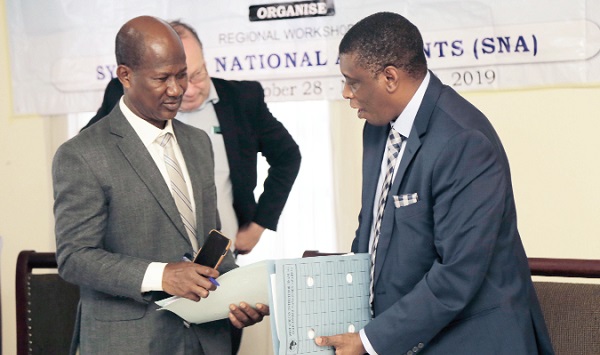News
‘Adopt current methods for collecting data on productivity’

The Director-General of the West African Institute for Financial and Economic Management (WAIFEM), Dr Baba Y. Musa, has urged Ghana and other countries in the sub-region to adopt the most efficient and current methodologies in compiling data on their national productivity.
He said updated and accurate statistics on gross domestic product (GDP) allowed governments to evaluate their fiscal positions better and provide investors with the basis to make informed decisions.
To achieve that, he stressed that it was important for all countries to build the capacity of the staff of their statistical and accounting institutions on the 2008 Systems for National Accounts (SNA) to make them efficient as a matter of urgency.
“Benefits accrue according to the quality of statistics a country produces because not only do investors, analysts and policy makers rely on them to act, it will also assist the country to take better decisions.
“WAIFEM cannot give any deadline to countries but for any country that is aiming at providing international services, it is obligatory on them to ensure that their statistics meet international standards,” he stressed.
Dr Musa was speaking at the opening session of a two-week training course on SNA in Accra yesterday.
The course
The 2008 SNA is the current accounting framework that outlines a coherent, consistent and integrated set of macroeconomic accounts in the context of a set of internationally agreed concepts, definitions, classifications and accounting rules.
The course, dubbed “AFRITAC West 2,” is a collaboration between the International Monetary Fund (IMF) and WAIFEM, with the objective to build the capacity of compilers of national accounts and statistics in West African countries.
Participants in the course, who are drawn from counties such as Ghana, Nigeria, Cape Verde, Sierra Leone, the Gambia, Liberia, would be taken through the overarching modules in SNA 2008.
In West Africa, it is only Nigeria that has migrated to the 2008 SNA. Some countries are still using the 1996 series of data gathering methodology.
The SNA system looks at the accounting principles and it is different from the rebasing, which looks at the year as the baseline for the figures being used.
Action
Dr Musa described the situation as unacceptable, saying that there was the need for the other countries to be abreast of international standards to be sure that investors would have confidence in all the statistics that they provided.
“We are encouraging countries to build the capacity of the compilers of national accounts based on the 2008 principle which is the updated compilation framework that is internationally agreed on by all countries.
“Countries that have not migrated to the 2008 SNA are understating their accounts and again, whatever they produce are not in line with international standards because there are errors that may have arisen because of lack of standardisation,” he stressed.
Timely call
In a speech delivered on his behalf, the Governor of the Bank of Ghana, Dr Ernest Addison, stressed that the call on West African countries to migrate to 2008 SNA was critical and needed to be taken seriously.
The speech was delivered by the Head of the Governance Department at the Bank of Ghana, Mr Eric Koranteng.
Ghana recently rebased her GDP by changing the base year from 2006 to 2013, while Nigeria rebased its GDP from $270 billion to $510 billion in 2014.
As a result of the rebased GDP, Ghana’s economy expanded by 25 per cent to $52 billion, making it the sixth largest economy in sub-Saharan Africa.
On the part of Nigeria, the rebasing increased the GDP by about 90 per cent and made the Nigerian economy the largest in Africa and the 26th largest in the world.
Better evaluation
Dr Addison noted that the rebased GDPs of those two countries paved the way for enormous economic gains, including appealing to investors better.
He said the GDP revisions allowed the governments to evaluate better their fiscal positions and allowed more accurate data to be generated for effective economic management.
The Governor stressed that with the importance of GDP statistics in mind, it was critical that all countries adopted the most efficient and current methodologies in compiling GDP data.
“Although Ghana has rebased its economy, it is yet to implement the 2008 version of SNA, and so it will encounter the challenges that face countries that are yet to implement the 2008 SNA such as poor coordination in data collection and use of the data needed for GDP rebasing as well as out of date GDP,” he said.
Source: Graphic.com.gh



